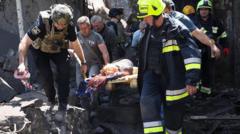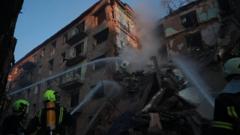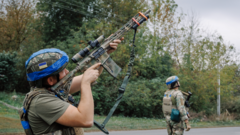In a pivotal moment for NATO, German Chancellor Friedrich Merz pledged Berlin's commitment to equitable defense spending as NATO leaders, including US President Donald Trump, gather in The Hague for a landmark summit. The Danish Prime Minister has stated that a combined investment from allied nations is essential for maintaining peace and stability in Europe.
Germany Commits to Europe's Defense at Historic NATO Summit in The Hague

Germany Commits to Europe's Defense at Historic NATO Summit in The Hague
Germany's chancellor emphasizes the importance of unity in defense spending amidst escalating threats.
Amidst escalating tensions with Russia and recent missile attacks on Ukraine, Chancellor Merz articulated Germany's resolve to contribute fairly to defense alongside Allies, declaring that the meeting will focus on ensuring a secure future for Europe. He acknowledged Russia's relentless ambitions concerning Ukraine and reiterated that military might remains critical.
A key agenda item at the meeting is the new NATO defense spending target of 5% of GDP, a significant increase compared to the existing guideline, with many countries still falling short of the 3% benchmark established in 2014. Building on this commitment, nations such as the UK have expressed their intention to align with increased spending, while countries like Spain remain reluctant to meet the new benchmarks. Despite some dissenting voices, consensus is expected on the new pledge as members navigate regional instability and collective security challenges.
As NATO leaders engage in discussions about strengthening military capabilities and backing Ukraine, the summit underscores a unified effort to address current threats and prepare for a secure, resilient Europe.
Expectations are high for future collaborations, with meetings between leaders like Merz and the UK's Prime Minister Keir Starmer and France's President Emmanuel Macron anticipated, reinforcing solidarity among member states amidst challenging geopolitical landscapes. The summit aims to send a clear message of unity and strength to external aggressors such as Russia, ensuring NATO's stability and reasserting its foundational principles of collective defense.
A key agenda item at the meeting is the new NATO defense spending target of 5% of GDP, a significant increase compared to the existing guideline, with many countries still falling short of the 3% benchmark established in 2014. Building on this commitment, nations such as the UK have expressed their intention to align with increased spending, while countries like Spain remain reluctant to meet the new benchmarks. Despite some dissenting voices, consensus is expected on the new pledge as members navigate regional instability and collective security challenges.
As NATO leaders engage in discussions about strengthening military capabilities and backing Ukraine, the summit underscores a unified effort to address current threats and prepare for a secure, resilient Europe.
Expectations are high for future collaborations, with meetings between leaders like Merz and the UK's Prime Minister Keir Starmer and France's President Emmanuel Macron anticipated, reinforcing solidarity among member states amidst challenging geopolitical landscapes. The summit aims to send a clear message of unity and strength to external aggressors such as Russia, ensuring NATO's stability and reasserting its foundational principles of collective defense.





















